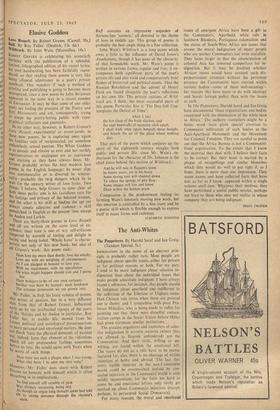Elusive Goddess
Love Respell. By Robert Graves. (Cassell, 50s.)
ROBERT GRAVES is celebrating his seventieth birthday with the publication of a splendid, limited, lithographed edition of his recent lyrics; his own handwriting has been faithfully repro- duced, so that reading these poems is very like being allowed admittance to a poet's private notebook. One wonders if such a method of Printing and publishing is going to become more Widespread, since a new poem by John Betjeman appeared in the same way in a recent number of Encounter. It may be that some of our older Poets are feeling the pressure of the Poetry and Jazz IVIoventetzts and are, consequently, trying to tempt the poetry-loving public with typo- graphical titillations and gimmicks. In no other way, however, is Robert Graves's Love Respell experimental or avant-garde; in these new poems, he is exploring once again his familiar vein of reciprocated, yet somehow Melancholy, sexual passion. The White Goddess is as moody and elusive as ever and her earthly representatives or analogues are as capricious and exciting as they have always been. Mr.
Graves probably writes the best modern love poems in the English language; he never slips
Into sentimentality or is diverted by whimsi- cality—probably the twig dangers which lie in
Wait for the unwary writer of love lyrics. Two
Lthings, I believe, help Graves to steer clear of both these perils; one is his fastidious care for the feelings and privacy of the beloved woman, and the other is his skill at finding the apt yet always simple adjective and cadence—a skill unmatched in English at the present time except by Auden and Larkin. There are thirty-three poems in Love Res pelt and all are written on the same level of ex- cellence; their tone is one of wry self-criticism
loving by warmth of feeling and delight in loving and being loVed. 'Whole Love' is charac-
teristic not only of this new book, but also of all Graves's work; this poem ends: Then love me more than dearly, love me .wholly, Love me with no weighing of circumstance As I am pledged in honour to love you: With no weaknesses, with no speculation On what might happen should you and 1 prove
less Than bringers-to-be of our own certainty. Neither was born by hazard: each foreknew The extreme possession we are grown into.
Mr. Fuller, in Buff, his latest volume of poems, also Writes of passion, but in a very different vein from that of \ Robert Graves. Influenced early on by the intellectual rigours of the poets of the 'thirties and by Auden in particular, Roy
Fuller has, in middle life, moved from his former political and sociological preoccupations
'0 more personal and emotional matters. He does not flinch from the physical demands of passion nor, indeed, from that element of the ridiculous 'thich all our profoundest feelings sometimes betray us into. He would agree with Yeats when he wrote of such things: They were not such a plague when I was young.
What else have 1 to spur me into song?
tIovvever, Mr. Fuller does share with Robert Craves an honesty with himself which is often disturbing in its implications:
To find oneself still capable of pain Was divinely reassuring, being old; As though an organ long thought spent had told Of its strong presence through the chemist's stain.
Buff contains an impressive sequence of thirteen-line 'sonnets,' all devoted to the theme of love in middle age. This group of poems is probably the best single thing in a fine collection.
John Wain's Wildtrack is a long poem which owes a little to the influence of David Jones's Anatheinata, though it has none of the obscurity of that formidable work. Mr. Wain's poem is written in various forms, regular and free; it en- compasses both significant parts of the poet's private life and also vivid and comparatively brief flashes of historical and political events. Thus the Russian Revolution and the advent of Henry Ford are found alongside the poet's reflections on his own life. The private sections of Wild- track are, I think, the most successful parts of this poem. Particular fine is 'The Day-Self Con- templates the Defeat of Time':
. . . when I feel the hot clasp of the body slacken, and the steel handcuffs of necessity click apart, I shall walk once again beneath those boughs, and breath the air of the place where nothing dies.
That part of the poem which conjures up the spirit of the eighteenth century mingles both public and private life, since Mr. Wain's en- thusiasm for the character of Dr. Johnson is the chief force behind this section of Wildtrack:
And he will rule in Reason's town In future years; yet in his brain Some Saving. root will channel down To where the springs of pity flow: Some images will live and know Deep within the human grain.
Compa'ssion is the predominant feeling in- forming Wain's intensely moving new work, but this emotion is controlled by a fine irony and by a poetic skill which is flexible enough to express itself in many forms and cadences.
ELIZABETH JENNINGS














































 Previous page
Previous page